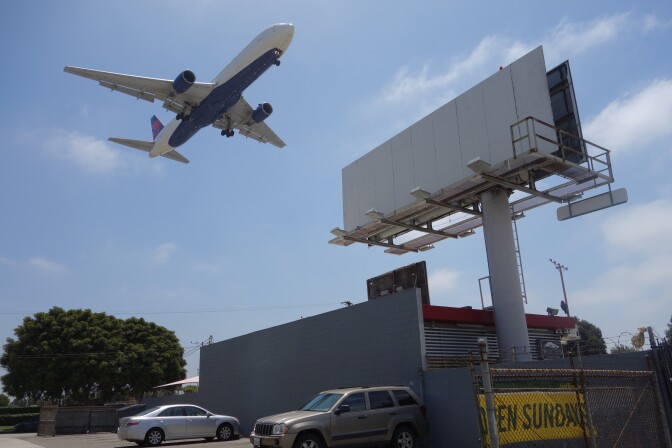This story is free to read because readers choose to support LAist. If you find value in independent local reporting, make a donation to power our newsroom today.
This archival content was originally written for and published on KPCC.org. Keep in mind that links and images may no longer work — and references may be outdated.
No amnesty for unlawful billboards, LA city planning board votes

In a big win for billboard opponents, the Los Angeles Planning Commission Thursday rejected lenient new rules for billboards that had been proposed by an L.A. City Council committee and championed by billboard companies and some business groups.
The commission members voted 7-0 for a series of measures that would require billboard companies to take down far more billboards than they put up.
The commission also rejected the Council's Planning and Land Use Management Committee's proposal to shield from legal action nearly 1,000 billboards that have no permits or that have violated their permits.
The heart of the billboard measure the commission favors is to limit new billboards to a few districts around the city. These would be places with intensive business activity, like parts of Downtown Los Angeles, Warner Center, and Northridge Plaza. A second tier of smaller billboard districts would permit the signs around sports stadiums and certain corporate and college campus areas.
The win for billboard opponents might turn out to be short-lived because the City Council ultimately decides what rules will govern billboards in Los Angeles.
But the City Council would have to muster a supermajority of its members to overrule the commission's recommendations. (Council voting rules are complicated, but here's how it works, according to the City Attorney's office: On its first try, the 15-member City Council would need a vote of 12 or more members to pass any version of the sign ordinance that differs from the one the commission voted on. One council member voting "no" pushes the ordinance to a second vote where it would have to get at least 10 votes.
Highlights of the Commission's recommendations:
- New billboards may only be erected within sign districts approved by the city.
- For every square foot of new static billboards that go up, the billboard company must take down five square feet of old billboards. For every new square foot of digital signage, ten square feet of old billboards must come down.
- Billboard companies would only get credit for removing signs that have permits. That means nearly 400 billboards that have been altered without permits, and some 500 more that have no permits may not be applied toward that takedown ratio.
- Planning Commissioners rejected having a conditional use process to give billboard owners special exemptions to erect billboards outside sign districts.
- Signs that are taken down in order to put up new ones must be in areas that have a "reasonable relationship" to the areas getting the new signs. That's hard to define, though. One commissioner said sign companies might want to flood affluent areas with signs and take down those in poor areas. Another commissioner said poor areas are disproportionately plagued with billboards and that more should come down in those areas.
- The commission rejected having a citywide cap on the number of new billboards that might go up.
- The commission was unable to agree on a proposal that would require billboard companies to eliminate all their unpermitted signs as a condition of applying for new billboard permits.
- The commission also held off on a decision on Councilman Paul Krekorian's idea to let digital ad signs go up on city property and earn money.
- Vinyl signs may not replace painted murals.
- The commission said the city should not exempt from the new law proposed sign districts that were proposed after March 2009. The Metropolis development in downtown Los Angeles qualifies, but a district proposed by Paramount Pictures in Hollywood does not.
- LA Planning Commissioners say current sign laws should be enforced by the Department of Building & Safety. The current hands-off policy is unacceptable, they say.








